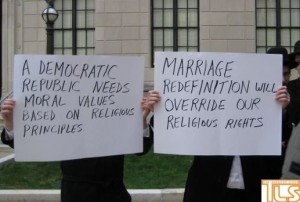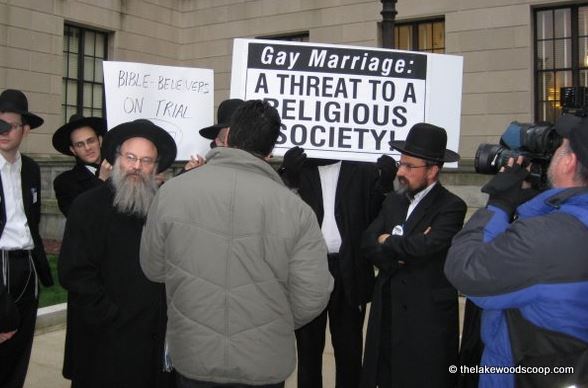 In a brief filed on behalf of Agudah during its argument against marriage definition, Attorney Larry Loigman, who served as the ‘friend of the court’ said the Supreme Court ruling for same-gender marriage could endanger religious liberty. (‘Friend of the court’ are individuals who help the court understand the impact that a decision would have, beyond its effect on the litigants themselves.)
In a brief filed on behalf of Agudah during its argument against marriage definition, Attorney Larry Loigman, who served as the ‘friend of the court’ said the Supreme Court ruling for same-gender marriage could endanger religious liberty. (‘Friend of the court’ are individuals who help the court understand the impact that a decision would have, beyond its effect on the litigants themselves.)
In this particular case, more than 100 individuals and organizations filed ‘friend of the court’ briefs, but Agudah was the only Jewish organization to argue against marriage redefinition and its potential harm to religious freedom.
Loigman stated the following:
Agudath Israel of America, a membership organization for many in the Orthodox Jewish communities throughout the United States, used its amicus curiae brief to argue against recognition of same-gender marriage by the Supreme Court. The dissents in Obergefell v. Hodges demonstrated grave concerns about issues similar to those which we raised.
Our position is founded on our faith in the immutable requirements of Torah law, but our argument to the Supreme Court was based on sound constitutional principles. As Chief Justice Roberts observed, judicial restraint is often appropriate, especially in dealing with “rights” that are not enumerated in the Constitution. The Constitution does not grant a “right” to marry – not in the Fourteenth Amendment or anywhere else – so the Court was addressing an “implied fundamental right” (slip. op., at 11). But judges must tread with unusual caution to avoid falling into a belief that their personal opinions are “implied” by the Constitution. That course can result in rulings which, in hindsight, often appear foolish; the Chief Justice cited such “discredited” decisions as Dred Scott v. Sandford, 19 How. 393 (1857) and Lochner v. New York, 198 U.S. 45 (1905). Political trends and social policy can inform, but should not substitute for, a firm Constitutional basis in the Court’s holdings.
This is not, however, simply a debate about the correct way for the Supreme Court to write its decisions. A major upheaval in American society, several justices insisted, should never come about without a deliberative process involving the people, whether through a constitutional amendment or legislative action. The Court’s removal of this issue from the hands of the citizens, its wresting of control from the individual states, its early termination of the ongoing national debate, all in the name of a discovery through “reasoned judgment,” is most unwise.
We are troubled, as are other organizations whose tenets maintain prohibitions on the “marriages” now endorsed by the Supreme Court, by the possibilities of collateral attacks on our religious freedoms. The privilege to enter into such “marriages” has been declared a fundamental right by judicial fiat, rather than by carefully crafted legislation; therefore, the exemptions for religious institutions that do not adhere to this opinion have not been delineated. The impact on various statutes relating to discrimination, tax exemptions, and so forth, is ominously unclear, but will undoubtedly result in years of further litigation. One major advocacy group has already called for the repeal of, or significant changes to, the Religious Freedom Restoration Act of 1993 (P.L. 103-141). In the name of a new “implied fundamental right,” the Supreme Court may have opened the door to challenges to the explicit fundamental right to free exercise of religion.”
[TLS]
—————————————-
This content, and any other content on TLS, may not be republished or reproduced without prior permission from TLS
Stay up to date via our news alerts, by sending ‘follow LakewoodScoop’ to the number ‘40404’ or via Twitter @LakewoodScoop
Got news? Email us at [email protected], text us 415-857-2667, tweet us @LakewoodScoop.


The Supreme Court made up a law which is not its job or right under our system of government that’s up to congress and legislators.
It doesn’t say any where in the Constitution that they have a right to marriage or that there is a basis to change the definition.
Should we all file as friends of th ecourt?
The problem with the Religious Freedom Restoration Act is that it uses section 5 of the Fourteenth Amendment. Congress cannot create a new right of the individual against the states through the Fourteenth Amendment. (Boerne v. Flores, 1997),
Congress needs to use its Article I, Section 8 powers to protect religious freedom in interstate commece. (Heart of Atlanta Hotel, 1964).
The Court based its decision on substantive due process.
I quote from Lang, A, The Marshall Doctrine, the Taney Doctrine and Calhounian Federalism, 10 Dartmouth L. Journ. 76 (2012).*
“Due process, as its name indicates, means that a process is due to all persons before the executive can deprive the person of life, liberty or property. John Calhoun invented substantive due process to restrict the power of Congress to regulate life, liberty or property – in this case, ownership of a slave in federal territory. Dred Scott overturned the Missouri Compromise, and all other compromises dividing United States territories over slavery, stripping Congress of the power to preserve itself and the nation, turning our moderate, election-oriented two-party system into a factional, sectional, issue-oriented multi-party system.** Ironically, after the adoption of the due process clause of Fourteenth Amendment, the ‘Calhoun Doctrine,’ substantive due process, becomes the great court-imposed restriction over state sovereignty, rivaling the commerce power of Congress. . . .
“[Afterwards,] the Court applied the doctrine of substantive due process through the Fourteenth Amendment to prevent states from regulating business in a line of cases beginning with Lochner v. New York (1905). This occurred while the Court denied the true meaning of the Civil War amendment in Plessy v. Ferguson (1896). The due process clause, the guarantee for government of law, was to provide for the government of men, the men on the Supreme Court.
“Mr. Justice Holmes vigorously dissented against the use of the words ‘due process of the law’ to protect the unenumerated substantive rights of property or liberty, holding that, ‘it is too late to deny that they have been given a much more extended and artificial signification . . . with no guide but the Court’s own discretion. . . .’*** With this reluctance, he set his famous standard for a substantive violation of due process, that ‘a rational and fair man necessarily would admit that the statute proposed would infringe fundamental principles as they have been understood by the traditions of our people and our law. . . .’****
“[Note] Lord Coke’s rule in Heydon’s Case (1587), that when the meaning of a law is in doubt, to look at the historic circumstances motivating its enactment. . . .
“The intent of Fourteenth Amendment, with its broad sweeping terms such as due process, privileges and immunities, and equal protection of the law, was plain and simple: to end racial discrimination by the states and their courts. This was the opinion of the Fourteenth Amendment Court, which rejected Calhoun’s substantive due process in The Slaughter-House Cases (1872). As for the fundamental principles, no doubt, these are the same as the ‘privileges and immunities which are, in their nature, fundamental; which belong, of right, [1] to the citizens of all free governments; and [2] which have, at all times, been enjoyed by the citizens of the several states which compose this Union, from the time of their becoming free, independent, and sovereign.’*****
“Note well that Justice Washington in Corfield described the unenumerated privileges and immunities as having two necessary elements. If either is missing, whether 1) a free government can reasonably prohibit the activity or 2) if any state in our Union has reasonably prohibited the activity, then it is not a fundamental right.
“Hence, Professor Thayer, Mr. Justice Holmes, and Mr. Justice Washington hold the unconstitutionality of laws only in cases of the universal. In their respective views, a law can only be repugnant to the constitution if ‘all men of sense and reflection in the community may perceive the repugnancy’ and ‘a rational and fair man necessarily would admit’ and if it abrogates a ‘right, [belonging] to the citizens of all free governments.’ The law has to be unreasonable to all free men.
* http://www.lakewoodlaw.org/Marshall%20Doctrine.html
**Adopted by the Court in Dred Scott v. Sandford, 60 U.S. (19 How.) 393, 450 (1857). “[A]n Act of Congress which prohibited a citizen from holding and owning property of this kind in the territory of the United States north of the line therein mentioned, is not warranted by the Constitution, and is therefore void.”
***Baldwin v. Missouri, 281 U.S. 586 (1930, Holmes, J., dissenting).
****Lochner v. New York, 198 U.S. 45, 76 (1905, Holmes, J., dissenting).
*****Corfield v. Coryell, 6 F. Cas. 546, 551 (Cir. Crt, E.D. Pa. 1823). Mr. Justice Washington listed the “right of a citizen of one state to pass through, or to reside in any other state, for purposes of trade, agriculture, professional pursuits, or otherwise; to claim the benefit of the writ of habeas corpus; to institute and maintain actions of any kind in the courts of the state; to take, hold and dispose of property, either real or personal; and an exemption from higher taxes or impositions than are paid by the other citizens of the state; may be mentioned as some of the particular privileges and immunities of citizens, which are clearly embraced by the general description of privileges deemed to be fundamental: to which may be added, the elective franchise, as regulated and established by the laws or constitution of the state in which it is to be exercised.”
Can TLS please post a pdf of the entire brief?